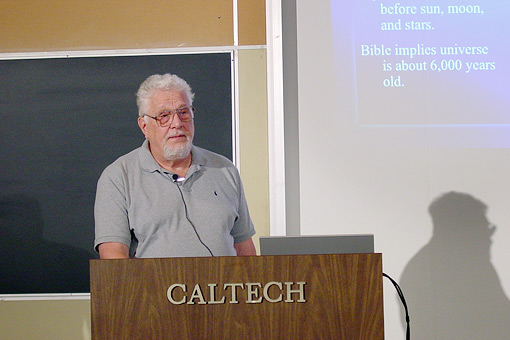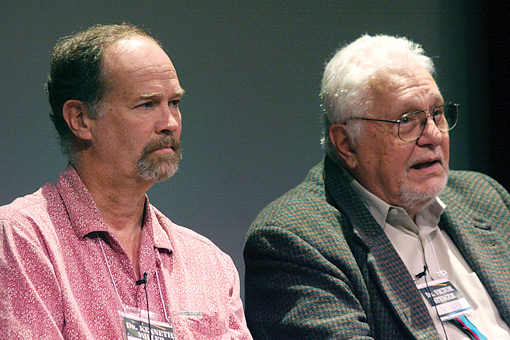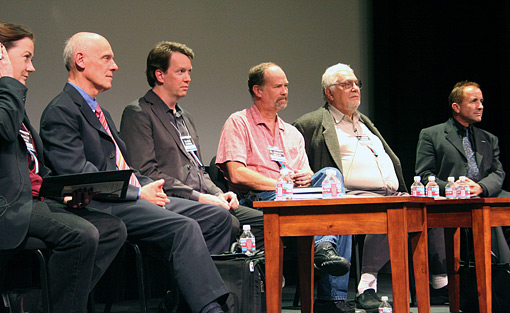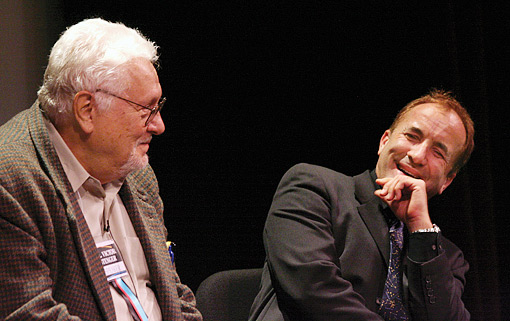Victor J. Stenger was a particle physicist, philosopher, author, skeptic, and friend. I first came across his name shortly after we founded Skeptic magazine in 1992 when I read his 1990 book Physics and Psychics: The Search for a World Beyond the Senses (Prometheus Books), for which “psychic” Uri Geller sued (the case was dismissed and Geller was ordered to pay legal fees of nearly $50,000). Stenger’s 1995 book, The Unconscious Quantum: Metaphysics in Modern Physics and Cosmology, was especially helpful to us as we dealt with the burgeoning interest in the topic of quantum consciousness and the New Age fascination with the field as a way of using one of the most well-developed and thoroughly tested fields in all of science to prop up supernatural and paranormal beliefs with sciency sounding terms (the very definition of pseudoscience).
Victor was especially helpful to me in assessing the technical claims of the quantum consciousness proponents, such as those featured in the wildly popular film What the Bleep Do We Know?! It was a well produced film (I saw it in Portland with the producers after we were both on a radio show), but I never imagined it would become the big hit it did, given the esoteric nature of its subject: quantum physics and consciousness. But it had that New Agey uplifting anything-is-possible-if-you-wish-it-so feel. It included a number of talking head physicists, such as University of Oregon quantum physicist Amit Goswami, who proclaimed: “The material world around us is nothing but possible movements of consciousness. I am choosing moment by moment my experience. Heisenberg said atoms are not things, only tendencies.” In my Scientific American column on the film I challenged him to “leap out of a 20-story building and consciously choose the experience of passing safely through the ground’s tendencies.”

Dr. Victor Stenger lecturing on science and religion at the Skeptics Distinguished Science Lecture Series at Caltech in 2003.
Here’s the main argument and Stenger’s explanation for why it is wrong. Inside our neurons are tiny hollow microtubules that act like structural scaffolding. Proponents of quantum consciousness suggest that something inside the microtubules may initiate a wave function collapse that leads to the quantum coherence of atoms, causing neurotransmitters to be released into the synapses between neurons and thus triggering them to fire in a uniform pattern, thereby creating thought and consciousness. Since a wave function collapse can only come about when an atom is “observed” (i.e., affected in any way by something else), the belief is that “mind” may be the observer in a recursive loop from atoms to molecules to neurons to thought to consciousness to mind to atoms. Vic explained to me that for a system to be described quantum mechanically the system’s typical mass m, speed v, and distance d must be on the order of Planck’s constant h. “If mvd is much greater than h, then the system probably can be treated classically.” According to Vic, the mass of neural transmitter molecules and their speed across the distance of the synapse are about three orders of magnitude too large for quantum effects to be influential. As he said, “the notion that we can control reality by merely thinking about it is nowhere implied by quantum mechanics and nowhere indicated by any scientific data.” Here is my favorite quote from Stenger on the subject:
Quantum mechanics is weird. But, it does not follow that everything weird is quantum mechanics.
You can read Victor’s many articles on this topic (and others) here: http://www.colorado.edu/philosophy/vstenger/meta.html
Victor Stenger was born and raised in New Jersey where he earned his B.S. in Electrical Engineering from the New Jersey Institute of Technology, later completing his Ph.D. in physics at UCLA in 1963. He was a professor of physics at the University of Hawaii for his entire career until his retirement in 2000, where he worked on the properties of atoms, particularly gluons, quarks, and neutrinos, and for the latter he also worked on neutrino astronomy and high-energy gamma rays. After retirement he and his wife Phylliss moved to Boulder, Colorado, where he was an adjunct professor at the university there, enabling him to focus on his skeptical activism in promoting science and reason.

Dr. Kenneth Miller and Dr. Stenger engage in debate on the origin of the universe at the Skeptics Society’s annual conference at Caltech.
Vic was a naturalist who did not believe in the existence of the supernatural. Mysteries yet unexplained—such as consciousness—could only be the product of normal and natural forces, and he saw no need to invoke spooky mysterious powers to explain the natural world. His activism was on two fronts: talks and books. Vic spoke twice for our Distinguished Science Lecture Series at Caltech, in 1996 on “Quantum Quackery” and in 2003 on “Does Science Prove God?” and both were emblematic of his style of well-organized, direct, and thorough analyses of whatever topic he was addressing. As a writer he was prolific, churning out books every couple of years. His style of writing included having numerous experts read early drafts of chapters in order to make them as accurate as possible. Scientists should not work in a vacuum because it is too easy to fool yourself and make errors and Vic applied this principle to his writings. Even an article he wrote for Skeptic magazine that I edited went through this process, making it all the better for the critical commentary he garnered before going into print with his idea (“Free Will and Autonomous Will: A Physicist’s Perspective on How We Are Accountable for Our Actions,” Skeptic Vol. 17, No. 4). Victor’s books are not potboilers or recycled blogs, but well referenced, methodical, and comprehensive analyses of whatever topic he took on: quantum physics, time, the origin of the universe and the laws of nature, fine-tuning, science and religion, and his last book, released just weeks after his death, God and the Multiverse, in which he considered both the theological and scientific implications of the possible existence of multiple universes. I was proud to have endorsed his last contribution to humanity on the back cover:
The multiverse is one of the most exciting and controversial ideas in all of science today, with implications for both cosmology and theology, and there is no one writing on these topics better than Victor Stenger. His exposition of difficult topics in physics is brilliantly lucid and his treatment of theologians and their religious beliefs unfailingly fair. With this book you are in the hands of a masterful thinker and writer. If you are going to read just one book on science and religion, this is that work.

From left to right: Nancy Murphy from the Fuller Theological Seminary, Hugh Ross from Reasons to Believe, Sean Carroll from Caltech, Ken Miller from Brown University, Victor Stenger and moderator of the Skeptics Origins’ Conference, and Michael Shermer.
I mean it. Victor Stenger was unfailingly fair with everyone and he was one of the nicest and most humble scientists I have known. He liked good food and fine drinks (he was a martini man) and at the various conferences at which we both spoke we would often share sustenance and libations and talk for hours about the great (and not-so-great) questions in life. He was proud to be a central figure in both the skeptical and humanist movements—he was President of the Hawaiian Humanists, a Fellow of the Center for Inquiry, a member of the Society of Humanist Philosophers, and in retirement President of the Colorado Citizens for Science. And although he had his political opinions he mostly kept them to himself, believing that science is best served under a large tent.
Vic was active not only in the distinct movements for scientific skepticism (of the type we do here at the Skeptics Society and at INSIGHT in particular) and secular humanism, but also a prominent contributor to the atheist movement. I have titled this essay “The Fifth Horseman” because in 2007 his book, God: The Failed Hypothesis: How Science Shows That God Does Not Exist (Prometheus Books) made it to the coveted New York Times bestseller list on the heels of four other similar works that also made the list: Sam Harris’ The End of Faith (2004), Richard Dawkins’ The God Delusion (2006), Daniel Dennett’s Breaking the Spell (2006), and Christopher Hitchens’ God is Not Great (2007). These four authors became known as the “Four Horsemen of the New Atheism” (or “The Four Horsemen of the Non-Apocalypse”) and were featured prominently in many popular publications as such. I always wondered why Vic wasn’t included (outside of the obvious fact that the “Five Horsemen” does not fit the literary reference). I know that Vic wondered that as well, but he was too proud to ever express it out loud. He was the only physicist of the group, and his expertise in answering the many physics-related arguments for the existence of God (the origin of the universe, the fine-tuned nature of the laws of physics, etc.) was crucial in the debate about to what extent science could answer theological or religious arguments. (Lawrence Krauss has since come to the fore with his 2012 book A Universe From Nothing.)

Victor Stenger and Michael Shermer share a moment of levity on stage at Caltech while debating the great origin questions.
Many scholars and scientists, such as Stephen Jay Gould (and myself for a time, until Vic talked me out of it) have argued that science and religion are, in Steve’s memorable phrasing, “nonoverlapping magisteria.” Vic’s contribution to the debate was to argue that the strongest arguments made by theologians and religious believers are empirical and testable claims. And in any case, as Vic often pointed out, the proponents themselves were claiming to have scientific evidence and arguments, so why not take them at their word and address their claims as such? He did just that in his many fine books and talks.
For all that, Victor, your absence leaves an awful hole. But your presence made the world a better place for us all, and your contributions to science and skepticism will never be forgotten. I close with these words from Victor’s book Has Science Found God?
I do not think science has to make any apologies. It looks at the world and tells it like it is. And we all live longer, better lives because of this dispassionate view. Sure, it commands awe and provides inspiration. Still, I would rather be operated on by a surgeon who sees me as an assemblage of atoms than one who lovingly tries to manipulate what he or she imagines are my vital energy fields.











In my opinion, Victor J. Stenger was one of the most important writers on freethought in history. For one thing, he understood quantum mechanics, and he did a great job of demonstrating that it was a valuable tool that did a good job or predicting. One of his main goals was to demonstrate that it was a human aritifact that worked, and that there was no justification in using it to undermine materialism.
He was a brilliant man, and he took to the freethought movement with the same enthusiasm as he had given to science. His writings on the subject are a priceless treasure. He lived a long life, but he still left us too soon.
Dr. Stenger deserves my highest level of gratitude. It wasn’t Richard Dawkins and his books that challenged me to think for myself and to value evidence. It was Stenger. I have all but his first three books and look forward to reading his last one soon. I only wish I could have met him in person and get my books singed by him. He will be missed…